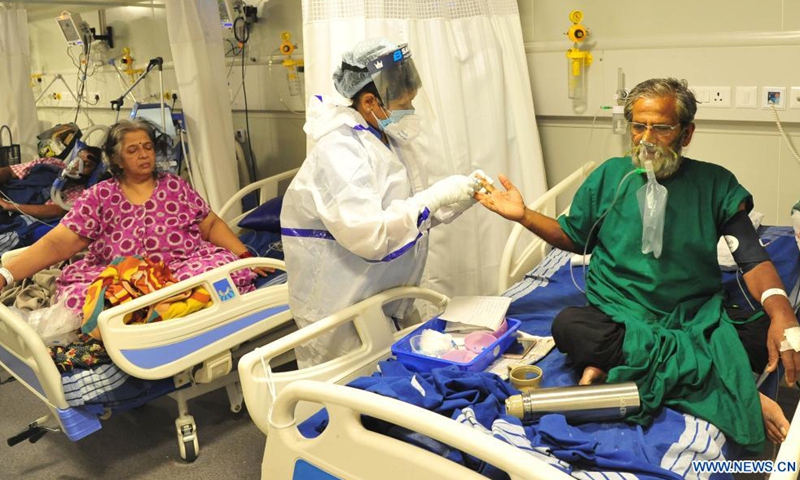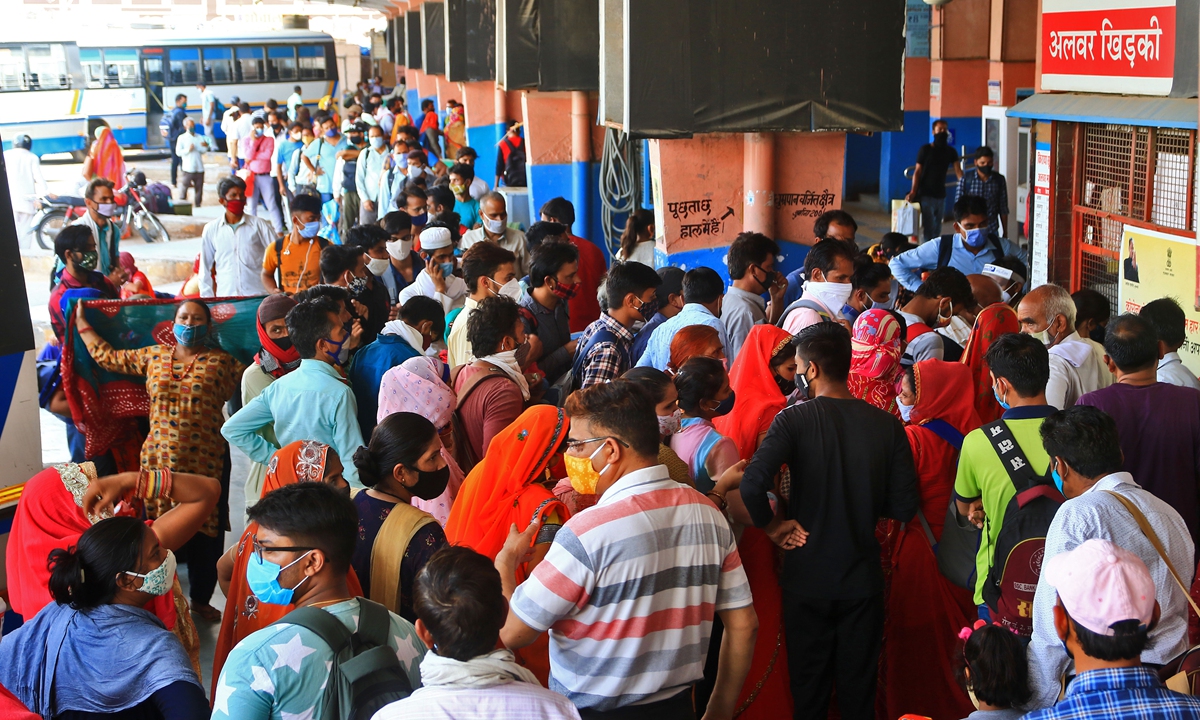Results could be 'disastrous' if new variant in India further expands to South Asia with its impact on vaccine effectiveness unknown: experts

Patients receive treatment inside a COVID-19 ward in a hospital, in Bangalore, India, April 30, 2021. India's COVID-19 tally reached 19,164,969 on Saturday, with a single day spike of 401,993 cases, the health ministry said. This is the first time when over 400,000 new cases were recorded in India in 24 hours, and a record number of 3,523 deaths since Friday morning took the total death toll to 211,853. (Str/Xinhua)
The World Health Organization (WHO) labeled the SAR-CoV-2 variant first identified in India as "a variant of global concern," which shows that the mutation may be more transmissible, more likely to cause infections, and more potent than current vaccines, some Chinese experts said. They warned that if the epidemic affects more of India's neighboring countries, it could lead to a disastrous crisis.
The WHO classified on Monday the coronavirus variant first identified in India in 2020 as a "variant of global concern" after some preliminary studies showed that it spreads more easily, according to media reports. It added to the list of multiple coronavirus variants, also known as SAR-CoV-2 variants, including three new variants identified since last year - one in the UK, one in South Africa and one in Brazil.
"The classification 'variant of global concern' means the variant might have greater transmissibility, and a greater impact on the protection rate of COVID-19 vaccines," a Beijing-based immunologist who requested anonymity told the Global Times on Tuesday.
Scientists have found new triple mutant strains in India, Indian media reported, saying that the mutant has been dominant in all Indian states recording surging infection numbers as the virus can mutate or change its structure depending on the scale of transmission. The more the virus spreads, the more it will mutate, the Financial Express said in April.
SAR-CoV-2 is an RNA virus, which is easy to mutate, like the flu virus that can easily mutate with genetic mutation, the above-quoted Chinese expert said.
With more mutants, the capability of transmission could be changed, either enhanced or weakened, Yang Zhanqiu, a virologist from Wuhan University, told the Global Times on Tuesday. "Given the current situation, with the scale of transmission continuing, the variant identified in India may affect more places in South Asia neighboring India that are also highly populated," he said.

Passengers stand in a queue at a ticket counter to board buses for their native place, after authorities announced 14 Days lockdown , amid surge in coronavirus cases across the country, at Sindhi camp bus stand in Jaipur , Rajasthan, India, on Sunday, May 9,2021. Photo: VCG
The variant identified in India has been spreading to neighboring countries, as Sri Lanka and Bangladesh had reported their first cases of the variant identified in India, according to some Indian reports over the weekend. It has also reached Southeast Asia as the Philippines has detected its first two cases of a coronavirus variant first identified in India, Reuters reported on Tuesday.
WHO chief scientist Soumya Swaminathan warned earlier that the variant spreading in India is more contagious and may be dodging vaccine protections. However, she clarified later on Monday on Twitter that she said the variant is more transmissible, but there's no data on its impact on diagnostics, therapeutics or vaccine effectiveness yet.
The previous three new variants included the one identified in the UK, with evidence suggesting that it may be associated with an increased risk of death compared with other variants. Another one was found in South Africa, and the one in Brazil has 17 unique mutations, according to a summary on the website of the US CDC. The WHO said in a post on its website that preliminary studies suggest the variant identified in South Africa is associated with a higher viral load, which may suggest a potential for increased transmissibility, while there is no clear evidence of the new variant being associated with a more severe disease or worse outcomes.
"Swaminathan is right. Scientists need more data and investigations on the Indian variant's impact on vaccine protection rates, and its major characteristics are different from previous new variants," Yang said.
Still, the current rapid transmission in India is a warning that if the variant spreads to more countries in South Asia, with a combined population of over 1.8 billion people, the scale of transmission will also be expanded with no effective control, and the results could be disastrous, the Chinese expert warned.
Rather than the variant strain, some Chinese public health experts attributed the grave epidemic situation in India to its loose and reckless anti-epidemic measures, and sweeping infections also severely affected the people's immune system, causing rising fatal fungal infections.
India's health authorities warned about a fungal infection seen in some COVID-19 patients which can disfigure facial features and even kill, Bloomberg reported on Monday, referring to mucormycosis, also called the "black fungus" infection.
"Fungus infection is a sign of low immunity, characterized by being difficult to treat with high mortality," the Beijing-based immunologist said.




